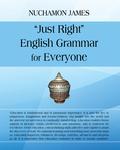Have you ever been frustrated, aggravated, irritated, upset, disturbed, annoyed, bothered, perturbed or discouraged when you are trying to write a decent paragraph in the English language, and suddenly found out that you are not sure of the grammar rules, and it is hard to locate that wizard to tell you once and for all whether you should place a comma here or there? You probably look into your dictionary first and scream out loud or yell at the innocent computer screen because the information you are looking for is not there. Do not panic or dread; help is on the way. This book is an attempt to give you a summary of resources when it comes to grammar in laypersons language. With the index in the back of the book, you will be able to easily and effortlessly locate what you want to look up and find the answer right at your fingertips. Speaking from previous English knowledge, skills, practices, understandings, familiarities and know-how, I realize that sometimes the more grammar books you read, the more confused you get. There are tons of grammar books out there, but upon which one can you rely? There are contradictions constantly when you read more than one grammar book. One book will tell you to use an "s" after 2005s to execute plurality; others may not recommend the same. In addition, languages are animate. They change all the time. They can get sick and die, and they can have newly generated sounds and words. Language has a life. Born and raised in Bangkok, Thailand, English was taught to me at an early age, but it was taught as a foreign language, where there were only a few English classes per week. I did not have the opportunity of being in a bilingual environment. I struggled and studied hard. My parents made sure that I received a great education. English was taught to me by so many teachers and professors from many different countries, some of whom were not native speakers of the English language. I received many different grammar rules that of


